Шрифт:
-100%+
THE SONG OF THE BOW
What of the bow?
The bow was made in England:
Of true wood, of yew-wood,
The wood of English bows;
So men who are free
Love the old yew-tree
And the land where the yew-tree grows.
What of the cord?
The cord was made in England:
A rough cord, a tough cord,
A cord that bowmen love;
And so we will sing
Of the hempen string
And the land where the cord was wove.
What of the shaft?
The shaft was cut in England:
A long shaft, a strong shaft,
Barbed and trim and true;
So we’ll drink all together
To the grey goose-feather
And the land where the grey goose flew.
What of the mark?
Ah, seek it not in England,
A bold mark, our old mark
Is waiting over-sea.
When the strings harp in chorus,
And the lion flag is o’er us,
It is there that our mark will be.
What of the men?
The men were bred in England:
The bowmen – the yeomen,
The lads of dale and fell.
Here’s to you – and to you!
To the hearts that are true
And the land where the true hearts dwell.
CREMONA
[The French Army, including a part of the Irish Brigade, under Marshal Villeroy, held the fortified town of Cremona during the winter of 1702. Prince Eugène, with the Imperial Army, surprised it one morning, and, owing to the treachery of a priest, occupied the whole city before the alarm was given. Villeroy was captured, together with many of the French garrison. The Irish, however, consisting of the regiments of Dillon and of Burke, held a fort commanding the river gate, and defended themselves all day, in spite of Prince Eugène’s efforts to win them over to his cause. Eventually Eugène, being unable to take the post, was compelled to withdraw from the city.]
The Grenadiers of Austria are proper men and tall;
The Grenadiers of Austria have scaled the city wall;
They have marched from far away
Ere the dawning of the day,
And the morning saw them masters of Cremona.
There’s not a man to whisper, there’s not a horse to neigh;
Of the footmen of Lorraine and the riders of Duprés,
They have crept up every street,
In the market-place they meet,
They are holding every vantage in Cremona.
The Marshal Villeroy he has started from his bed;
The Marshal Villeroy has no wig upon his head;
‘I have lost my men!’ quoth he,
‘And my men they have lost me,
And I sorely fear we both have lost Cremona.’
Prince Eugène of Austria is in the market-place;
Prince Eugène of Austria has smiles upon his face;
Says he, ‘Our work is done,
For the Citadel is won,
And the black and yellow flag flies o’er Cremona.’
Major Dan O’Mahony is in the barrack square,
And just six hundred Irish lads are waiting for him there;
Says he, ‘Come in your shirt,
And you won’t take any hurt,
For the morning air is pleasant in Cremona.’
Major Dan O’Mahony is at the barrack gate,
And just six hundred Irish lads will neither stay nor wait;
There’s Dillon and there’s Burke,
And there’ll be some bloody work
Ere the Kaiserlics shall boast they hold Cremona.
Major Dan O’Mahony has reached the river fort,
And just six hundred Irish lads are joining in the sport;
‘Come, take a hand!’ says he,
‘And if you will stand by me,
Then it’s glory to the man who takes Cremona!’
Prince Eugène of Austria has frowns upon his face,
And loud he calls his Galloper of Irish blood and race:
‘MacDonnell, ride, I pray,
To your countrymen, and say
That only they are left in all Cremona!’
MacDonnell he has reined his mare beside the river dyke,
And he has tied the parley flag upon a sergeant’s pike;
Six companies were there
From Limerick and Clare,
The last of all the guardians of Cremona.
‘Now, Major Dan O’Mahony, give up the river gate,
Or, Major Dan O’Mahony, you’ll find it is too late;
For when I gallop back
’Tis the signal for attack,
And no quarter for the Irish in Cremona!’
And Major Dan he laughed: ‘Faith, if what you say be true,
And if they will not come until they hear again from you,
Then there will be no attack,
For you’re never going back,
And we’ll keep you snug and safely in Cremona.’
All the weary day the German stormers came,
All the weary day they were faced by fire and flame,
They have filled the ditch with dead,
And the river’s running red;
But they cannot win the gateway of Cremona.
All the weary day, again, again, again,
The horsemen of Duprés and the footmen of Lorraine,
Taafe and Herberstein,
And the riders of the Rhine;
It’s a mighty price they’re paying for Cremona.
Time and time they came with the deep-mouthed German roar,
Time and time they broke like the wave upon the shore;
For better men were there
From Limerick and Clare,
And who will take the gateway of Cremona?
Prince Eugène has watched, and he gnaws his nether lip;
Prince Eugène has cursed as he saw his chances slip:
‘Call off! Call off!’ he cried,
‘It is nearing eventide,
And I fear our work is finished in Cremona.’
Says Wauchop to McAulliffe, ‘Their fire is growing slack.’
Says Major Dan O’Mahony, ‘It is their last attack;
But who will stop the game
While there’s light to play the same,
And to walk a short way with them from Cremona?’
And so they snarl behind them, and beg them turn and come,
They have taken Neuberg’s standard, they have taken Diak’s drum;
And along the winding Po,
Beard on shoulder, stern and slow
The Kaiserlics are riding from Cremona.
Just two hundred Irish lads are shouting on the wall;
Four hundred more are lying who can hear no slogan call;
But what’s the odds of that,
For it’s all the same to Pat
If he pays his debt in Dublin or Cremona.
Says General de Vaudray, ‘You’ve done a soldier’s work!
And every tongue in France shall talk of Dillon and of Burke!
Ask what you will this day,
And be it what it may,
It is granted to the heroes of Cremona.’
‘Why, then,’ says Dan O’Mahony, ‘one favour we entreat,
We were called a little early, and our toilet’s not complete.
We’ve no quarrel with the shirt,
But the breeches wouldn’t hurt,
For the evening air is chilly in Cremona.’
THE STORMING PARTY
Said Paul Leroy to Barrow,
‘Though the breach is steep and narrow,
If we only gain the summit
Then it’s odds we hold the fort.
I have ten and you have twenty,
And the thirty should be plenty,
With Henderson and Henty
And McDermott in support.’
Said Barrow to Leroy,
‘It’s a solid job, my boy,
For they’ve flanked it, and they’ve banked it,
And they’ve bored it with a mine.
But it’s only fifty paces
Ere we look them in the faces;
And the men are in their places,
With their toes upon the line.’
Said Paul Leroy to Barrow,
‘See that first ray, like an arrow,
How it tinges all the fringes
Of the sullen drifting skies.
They told me to begin it
At five-thirty to the minute,
And at thirty-one I’m in it,
Or my sub will get his rise.
‘So we’ll wait the signal rocket,
Till.. Barrow, show that locket,
That turquoise-studded locket,
Which you slipped from out your pocket
And are pressing with a kiss!
Turquoise-studded, spiral-twisted,
It is hers! And I had missed it
From her chain; and you have kissed it:
Barrow, villain, what is this?’
‘Leroy, I had a warning,
That my time has come this morning,
So I speak with frankness, scorning
To deny the thing that’s true.
Yes, it’s Amy’s, is the trinket,
Little turquoise-studded trinket,
Not her gift – oh, never think it!
For her thoughts were all for you.
‘As we danced I gently drew it
From her chain – she never knew it
But I love her – yes, I love her:
I am candid, I confess.
But I never told her, never,
For I knew ’twas vain endeavour,
And she loved you – loved you ever,
Would to God she loved you less!’
‘Barrow, Barrow, you shall pay me!
Me, your comrade, to betray me!
Well I know that little Amy
Is as true as wife can be.
She to give this love-badged locket!
She had rather.. Ha, the rocket!
Hi, McDougall! Sound the bugle!
Yorkshires, Yorkshires, follow me!’
* * * * *
Said Paul Leroy to Amy,
‘Well, wifie, you may blame me,
For my passion overcame me,
When he told me of his shame;
But when I saw him lying,
Dead amid a ring of dying,
Why, poor devil, I was trying
To forget, and not to blame.
‘And this locket, I unclasped it
From the fingers that still grasped it:
He told me how he got it,
How he stole it in a valse.’
And she listened leaden-hearted:
Oh, the weary day they parted!
For she loved him – yes, she loved him —
For his youth and for his truth,
And for those dying words, so false.








